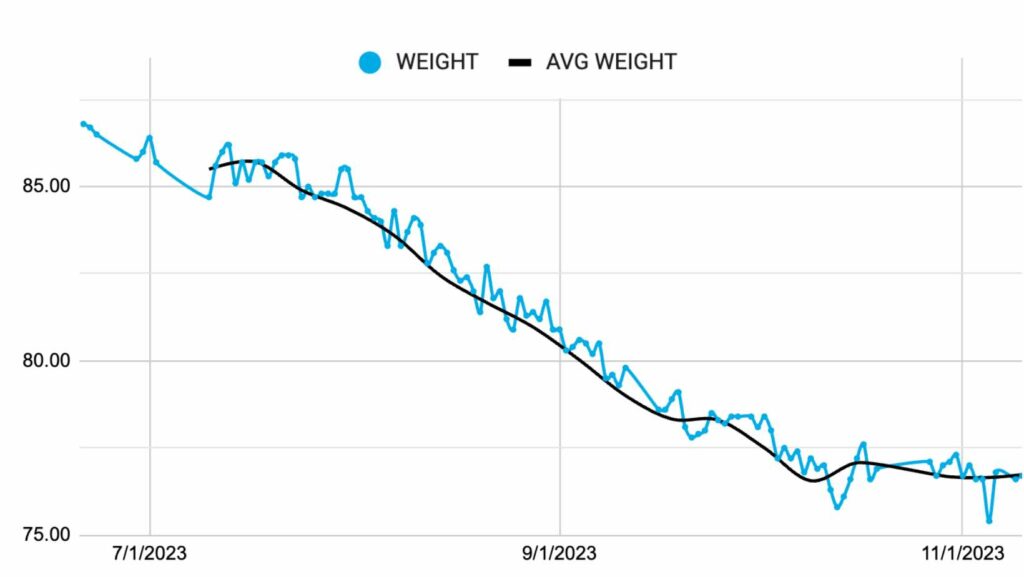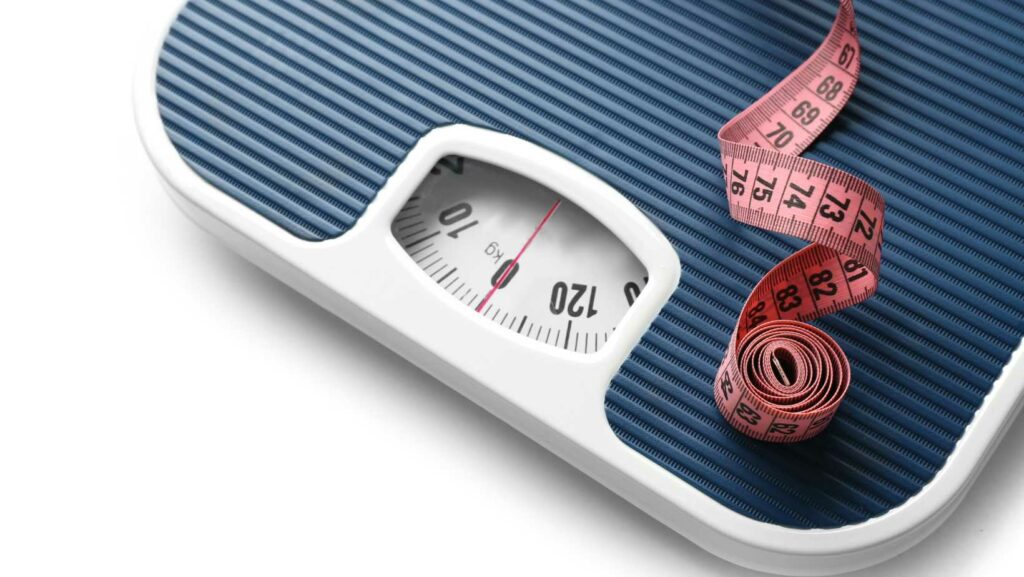Then you stepped on the bathroom scale this morning, excited to see how low your body weight was going to be…
… just to see a HIGHER number compared to what it was yesterday?!
How did that make you feel?
- Angry?
- Sad?
- Frustrated?
How did you respond? Did you think:
- “Today I’ll eat even less and do even more cardio”?
- “F this, drive-through for breakfast it is. This doesn’t work for me anyway”?
You do your best, but it just isn’t showing on the scale. And that’s where those self-doubting thoughts come up; “Am I doing something wrong?”
Imagine a life where the scale doesn’t dictate your mood for the day. Imagine being able to use it as a tool that helps you reach your goal, instead of viewing it as the goal. Where YOU are in control, not that number on the scale.
Now let me say this, I totally understand your frustration, I get it! If it wasn’t for my personal 30kg weight loss journey, I wouldn’t be here talking to you. I used to have similar feelings.
It sucks seeing your weight go up all of the sudden while you’re trying to lose weight.
But did you know that weight fluctuations are completely normal, and often happen every single day?
In this blog, I’ll teach you exactly WHY the scale fluctuates so much, how to interpret your weigh-ins properly, and how to stop allowing that number on the scale to ruin your day or demotivate you.
- Before you jump in – If you’re currently struggling to lose weight, and/or you aren’t sure what to do, then feel free to request a complimentary (non-binding) consultation call (click here). I understand this health and fitness Odyssey can be a tough one to figure out on your own, which is why I’d love to give you 30 minutes of my time to discuss your goals, where you’re at, and how you can move forward TODAY.
Now, let’s talk body weight…
Table of Contents
Body Weight is a Tool, NOT the Goal
If scale weight wasn’t such a useful tool, we would not use it with our online nutrition coaching clients. However, we’ve found that without scale weight you’re just guessing at best.
That’s not to say body weight is everything, it’s not.
But even though you may not love stepping on the scale, I’m going to push you to do it anyway. Every single day.
Be open to it, learn and grow from doing something you don’t fully love doing, and you’ll soon realize why weighing yourself daily should likely be an essential part of your morning routine.
That’s for three reasons:
First off, research indicates that self-monitoring significantly increases your chances of long-term weight loss maintenance. That goes for food intake, but also body weight.
Second, if you weigh yourself once weekly or monthly, you might as well not do it at all. We specifically recommend daily – you’ll learn more about that below.
Third, at Odyssey Coaching Systems, we believe in challenging ourselves instead of avoiding discomfort.
By avoiding the scale, you allow the scale to be in charge. By stepping on it anyway, you can develop a F-you mentality toward the scale and learn how to use it to your advantage. YOU are in charge!
I’ve seen so many clients go from not wanting to have anything to do with the scale, to weighing themselves every single day without it bothering them the tiniest bit.
They don’t instantly love it, but because it happens daily, it slowly becomes something meaningless. It’s just part of their routine.
Wake up – pee – check the scale – log it in their client sheets – that’s it, on with their day.
Your body weight is not your price tag.
It doesn’t define your personality,
it doesn’t define your worth,
it doesn’t mean anything.
Tell me, does your bank account balance define whether you’re a good or bad person?
Exactly, it doesn’t.
It’s just a measure, a data point.
You spend money, earn money, neither of which is inherently good or bad. Your balance and long-term trends however, can give you a good idea of how you’re doing financially – Keep that one in mind, because I’ll bring it back later.
The goal is to lose body FAT, and stay at an objectively healthy body fat level.
That means that sure, body weight will go down with that, just not all the time. You can gain weight without gaining fat, and you can lose fat without losing weight.
Not just that… Once you begin to put on muscle – which is a crucial part of your journey – you’ll even GAIN some weight!
Building muscle comes with many benefits, including better blood sugar regulation, a better physique, and a faster metabolism. All which are much more important than that number on the scale.

Don't Just Weigh Yourself - Measure, Capture, and Check How you FEEL
Body weight by itself won’t show you a complete picture of what’s going on. Though when combined with body measurements and progress photos you get to see what’s really going on.
Not just that, progress can mean so many other things. Better sleep, cognitive function, energy levels, sex drive, relationship with food…
Then there are important health markers like blood pressure, blood sugar levels, lipids, sex hormones…
All are invisible to the scale, and all are infinitely more important than body weight.
Now, you can’t change your relationship with the scale by reading a single blog post.
But equipped with the following information, and the tips I will give you towards the end, you will know how to use it to your advantage.
Again, it’s just data!
Use it, don’t let it use you.
Are Weight Fluctuations Normal? Here's why the Scale Went up
It is completely normal to see weight fluctuations from up to as much as 1 – 2 %.
Yes, that can be multiple kilos/pounds ANY given day!
Usually – if you’re keeping track of things like your food intake, stress levels, sleep, menstrual cycle, etc. – you can look at your data from a few days ago and get a good idea why the scale jumped up.
The opposite can also happen. Even during a muscle gain phase, it’s common to sometimes wake up lighter than expected.
Whether you’re trying to lose body fat, build muscle, or even maintain your current body weight, weight fluctuations WILL happen.
That goes for everyone, 100% of the time.
So… what influences your body weight so much from day to day?
The more obvious ones:
- Time of last meal
- What you ate
- How much you ate
- Overall food quality
- Hydration
- Toilet visits
Other factors (which influence water retention) include:
- Sleep
- Stress
- Salt intake
- Training
- Alcohol
- Menstrual cycle
- Carbohydrate intake
- Which phase you’re in (fat loss, reverse diet, etc.)
Especially once you move out of a fat loss phase, back into maintenance, you may see a lot of fluctuations. Here’s why…
Carbohydrate gets stored in both your liver and muscle tissue as glycogen (or used for direct energy). With every 1g of glycogen you store, an additional 3-4g of water gets pulled into the muscle cell.
During a diet, your glycogen stores deplete overtime (depending on the protocol, this can happen pretty fast). This is why all those crazy low-carb diets can show quick weight loss, you just lose a bunch of water!
Coming out of that, because you didn’t fuel up your fuel tank for a while, you’ll begin to replenish your glycogen stores. In my experience, this usually comes with even more weight fluctuations than before at first.
Now this isn’t bad weight either, it’s not ‘bloat‘. You NEED those carbs and that water in your cells for your muscles to function well, plus it makes your muscle look more full (because they literally ARE more full).
But that’s also why when you do something restrictive like cutting out all carbs, you’ll see a quick rebound in weight once reintroducing carbs; 1. you eat more, which means more food in your stomach, which comes with a bit of weight (also from water retention), and 2. your body is refuelling!
Why to Weigh Yourself, Everyday
Now you know why not to worry about your weight being up or down all of the sudden.
You understand that it’s completely normal, and that it really doesn’t matter that much.
You now know to expect your weight to be up after a night out with beers, salty snacks, and crappy sleep.
So, why would you still use the scale to track your progress?
Because what gets measured, gets managed.
Knowing that daily weigh-ins can fluctuate, let’s get a daily measure and track your weekly averages. That way you get a better idea of what your weight’s doing on a weekly, even monthly basis.
Weigh yourself daily (or at least three times a week), just to see how much it can differ from day to day. And remember, it’s the long term trends that matter most.
If you catch yourself getting frustrated because of a single weigh-in, zoom out! Compare week to week, month to month.
Most importantly, don’t be too quick adjusting your food intake based on short-term data – this is where a coach can keep you in check.
Optimal Rates of Weight Loss/Gain
It’s pretty common for people to get a little too excited. Things like ‘crash dieting’ or ‘dirty bulking’ might make you think that the more you increase/decrease your calories, the better.
Because who doesn’t want to get to their goals as soon as possible?
It’s in our nature to look for what rewards us now, so it’s hard to take it slow and do something that might benefit us in the future.
We’re wired to look for instant gratification, while the key to REAL, long-term results is the ability to DELAY gratification.
However, the faster you lose weight the more muscle mass you risk losing together with that body fat.
On top of that, your body will likely adapt to these lower calories sooner. This can have you hit a weight loss plateau sooner in the short term and can cause negative metabolic and hormonal adaptations in the long run.
So what if your goal is to GAIN muscle/weight? Same, same, but different.
The faster you gain weight, the more body fat you’ll gain together with that muscle.
One exception to this rule is be something called ‘newbie gains’. If you’re completely new to lifting weights, you can expect a good chance to put on quite a bit of muscle mass while losing body fat. So if you’re at the beginning of your journey, that’s great news! Enjoy it while it lasts 😉
Now, if that isn’t you, you’ll likely get the best results by sticking to the following optimal rates of weight loss and weight gain. The key is to find that sweet spot where you see good results, but you’re not going too fast or too slow.
- For weight loss: Try to stick within 0.5% and 1% of weight loss per week. 0.5% being most sustainable, and 1% being most ‘extreme’. You could go even slower, though you’d probably feel like it’s taking too long. Faster than 1% of weight loss is not recommended.
- For weight gain: Try to stick within 0.25% and 0.5% of weight gain per week. Yep.. You read that right, that’s a couple hundred grams per week, maybe. If you’re aiming to put on some serious muscle, you’re going to have to dedicate a whole lot of time to the progress.
- For weight loss: Try to stick within 0.5% and 1% of weight loss per week. 0.5% being most sustainable, and 1% being most ‘extreme’. You could go even slower, though you’d probably feel like it’s taking too long. Faster than 1% of weight loss is not recommended.
Even if you don’t see any changes for weeks, please be patient. Don’t adjust your calories after a week of not seeing any changes on the scale. Give it 2-4 weeks, only then decide. In both cases, your body will respond by trying to offset the change in calories coming in, by burning more/fewer calories.

Bonus: Menstrual Cycle vs Weight Fluctuations
With the differences between the follicular and luteal phases, and changes in both Estrogen and Progesterone, you can expect changes in mood, cravings, performance, insulin sensitivity, metabolic rate.. but also water retention! This will show up on the scale, but even in body measurements.
Typically, water retention goes up throughout the luteal phase, and then slowly drops again after menstruation.
With so much going on hormonally, it’s important to again zoom out and look at long term trends instead of daily weight fluctuations. Again, those daily weigh-ins are normal!
You already know to track your weekly averages, but even then, don’t compare your current week to last week. Instead;
- Compare week 1 of your cycle to week 1 of your previous cycle.
- Compare week 2 to week 2.
- Compare week 3 to week 3.
- And compare week 4 to week 4.
Otherwise – with all of those changes going on in your body – you’d be comparing apples to pears!
Thank you for reading this article.
You see… Although it’s understandable to feel frustrated with the scale, you now know better.
t’s just data, it’s just a tool, and it’s most definitely not the goal.
Use the data to your advantage, use it TO reach your goal. Just do yourself a favor, don’t let it decide your mood for the day. It’s simply not worth it 🙂





